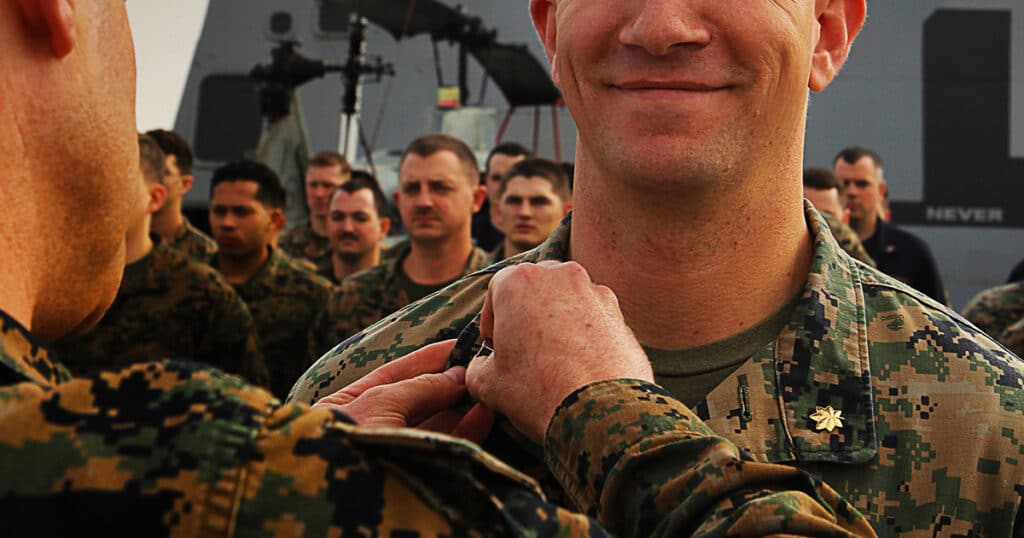
Our Rotten Military Promotion System
A Marine sniper serving during the Afghanistan evacuation recently gave testimony to the House Foreign Affairs Committee on the Afghanistan evacuation. His pain was palpable. A revelation worth examining was his identification of the possible suicide bomber prior to the incident. After the sniper, Sgt Vargas-Andrews, confirmed the target with multiple agencies, he asked his Battalion Commander, LtCol Whited, for permission to shoot. The answer from Whited, one in which Vargas-Andrews said he’ll never forget, was, “I don’t know.”
Not found in the media or Congressional testimony is that Whited, a former peer of mine, corroborated this version of events in his formal statement for the military’s investigation. When speaking to the investigating officer, General Curtis, on 5 October 2021, Whited stated, “[We had] a description of a person of interest. We watched him for hours… It bothers me still that we lost track of him, and never heard anything back from higher about him.”
The obvious indecision in Kabul on 26 August 2021 has a much deeper undercurrent. Since World War II, the American military promotion system hasn’t evolved with the needs of today’s challenging security environment. Current military professionals are conditioned, above all else, to please superiors for continued advancement. Said another way, when promotion is the mission, it will always be more important than troop welfare. “I don’t know” is another way of saying, “The risk to force isn’t as great as the risk to my career.”
This understanding leads to an obvious question: Can the military incentivize performance over career progression?
Predictably, without changes to the military system, the lessons of the past will consistently need to be re-learned. In some depressing ways, the Afghanistan evacuation was executed incrementally better than the 1983 Beirut operation; Vargas-Andrews at least had bullets in his gun. The Marines standing post in Beirut weren’t allowed to insert magazines into their weapons. Those Marines were forced to watch a vehicle IED drive past their security post and kill 220 Marines. General officers from the Beirut incident later testified to Congress that negligent discharges into the city were more of a risk than providing Marines on post the lethal force required for protection.
Unfortunately, like the unnecessary loss of life during the Afghanistan evacuation, general officers following the 1983 Beirut incident were also absolved of responsibility. In fact, General Alford Gray, who commanded the division of the attacked Marine unit, later went on to become the Commandant of the Marine Corps. Similarly, General Farrell Sullivan, the officer who LtCol Whited “never heard back from,” was promoted in billet upon his return the states. Despite General Berger, the Commandant of the Marine Corps, stating on 1 September 2021 that he wanted an “honest, open critique, or a commission… that cracks open the options available [for the Afghanistan evacuation,]” an internal military panel never materialized. This may be for many reasons. Yet an objective analysis must acknowledge that General Farrell Sullivan, who both the sniper and battalion commander waited on for engagement approval, also previously served as the battalion executive officer in 2002 while General Berger commanded 3/8. Again, never underestimate the importance of relationships and pleasing a boss in the antiquated military system.
Compounding the general officer’s inability to hold themselves accountable, Congress, enamored of the military officer, also fails to provide accountability even after listening to long lists of inexcusable mistakes. While Congress controls the DoD budget, they demonstrate an unwillingness to use the budget as a tool for influence. Why? Asking tough questions is less risky than being painted as ‘anti-military’ for standing in the way of the DoD budget. In other words, there are fewer risks to career advancement within the current model. Sound familiar?
It is also worth noting that most Americans apolitically believe President Biden mishandled the Afghanistan evacuation. But most Republicans only selectively remember President Reagan strengthening the military. President Reagan made the decision to send Marines to Beirut, and Reagan, much like Biden, was too afraid to hold senior military leaders accountable for their failures.
A commander in chief is unlikely to fire a general for military failure if it reflects poorly on the president’s decision making. If the lists from the 1983 Beirut operation, the Afghanistan evacuation, and the numerous other in-between examples aren’t enough to justify the relief of a general officer, self-serving incentives dictate that military officers should consistently default towards career protecting decisions.
The underlying reason for this “I don’t know” or “I was just following the orders I was given” culture is the current promotion system. In every branch of service, officer promotions are based solely on subjective evaluations from a boss. While most people want to believe that military commanders evaluate subordinates based strictly on occupational performance, anyone who has served knows that impressing a boss for a top evaluation requires substantially more finesse than job performance. Military professionals are hyper aware that during some critical billets, it only takes one bad evaluation to end a career. Thus, the secret to a military career is more about pleasing a boss, than demonstrating objective performance.
The House Armed Forces Committee renewed investigation into the Afghanistan evacuation may continue illustrating shortfalls by senior military leaders. But without a mechanism to change the culture of the military, current people-pleasing incentives will ultimately dictate the future actions of military professionals.
I believe the military must move to a performance-based promotion system now. Americans can no longer afford the unnecessary loss of life of their sons and daughters based on antiquated systemic career progression incentives. The next Secretary of Defense should make this a focus above all other initiatives. A boss’s assessment may be a factor in promotion, but occupational performance must be more important.
The military should develop warfighting games pitting leaders against each other. Make it truly free play. F-16 pilot against F-16 pilot, infantry officer against infantry officer, logistician against logistician, and so on. The winner must demonstrate performance through action, not assessment through the eyes of a boss. The winner receives preferential treatment for promotion. Furthermore, the next Secretary of Defense must be more aggressive in building a system of incentives for promotion based on performance, not time. Any military member should be able to ‘try out’ for higher ranks during the wargame competition. Move talented leaders up more quickly. This will do more for retaining talent than all other initiatives.
If the military builds a true performance-based system, it is more likely the leaders of the organization will be empowered by their judgment than by the assessments and opinions of their superiors. Hopefully, the next Sgt Vargas-Andrews never receives the answer, “I don’t know.” Performers make decisions. People pleasers and rule followers wait for the answer from a superior.
Can the military incentivize performance over career progression? I believe it can, but leadership must fundamentally change the system of incentives prioritizing career progression over junior service member’s sacrifices. This starts with new leadership demonstrating the same courage expected from the troops on the ground.
Stuart Scheller is a former LtCol, USMC and author of Crisis of Command: How We Lost Trust and Confidence in America’s Generals and Politicians
This article was originally published by RealClearDefense and made available via RealClearWire.


